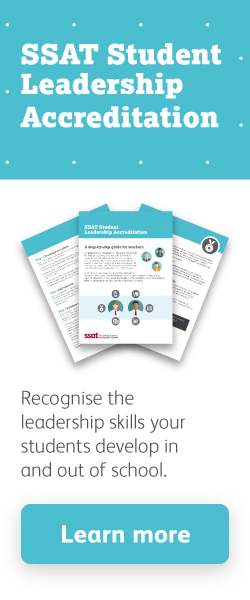
As this year’s Children’s Mental Health Week draws to a close, Sylvia King, Senior Education Lead at SSAT, analyses the Children’s Commissioner’s latest report which highlights the increased need for children to access support for their mental health
This week, there has been much in the press to highlight Children’s Mental Health Week 2021, launched by HRH the Duchess of Cambridge with the theme Express Yourself. Place2Be have produced a range of resources for students and schools to support and highlight the importance of young people’s mental health.
Young Minds’ report on their September survey looks at the impact of Coronavirus on young people with mental health needs and highlights that being Covid safe in schools has a knock-on effect on young people’s access to support within the school environment. It’s clear in explaining that this isn’t a criticism of schools, but it does highlight that schools are under huge pressure and have significant additional financial demands. The report calls for significant extra ring-fenced funding, above the £8 million Wellbeing for Education Return programme, to allow schools to address student wellbeing issues that might prevent them from engaging with their learning.
Last week, the Children’s Commissioner published The state of children’s mental health services 20/21 – their latest report which makes for grim reading. It highlights the fact that access to children’s mental health services is still not adequate and that there is a postcode lottery in terms of access to mental health services for young people. The report also shows the increased need for children to access help with their mental health, with referrals up by 73% in September 2020 compared to September 2019.
It’s reassuring that what schools experience on the ground is being recognised and documented, but it does little to help them support students currently experiencing mental health issues or, equally importantly, to ensure the wellbeing of all their students. Schools are well aware of the pandemic’s impact and the effect that school disruption and closures have had on the young people in their care, but sadly, there’s little to support them in tackling the issues. School leaders and teachers are part of a caring profession, but we’re not fully equipped, supported financially, trained or given the time required to deal with the unprecedented circumstances facing our young people.
That’s not to say that we do nothing. Schools across the country are dealing with student wellbeing as best they can, and we hear reports of excellent work being done to help young people. Many schools have existing mental health and wellbeing development plans underpinning their approach to supporting students. Others incorporate a coaching approach, allowing students to express and articulate their concerns and successfully address early stress and anxiety to help avoid the need for students to be referred to outside agencies. Where possible, schools are trying to ensure that there is continuity through set assemblies and form times despite other disruptions.
Whatever’s possible in schools, it‘s clear that now, more than ever, there’s a need for schools to access clear pathways for external support. The Children’s Commissioner calls for an urgent introduction of mental health support teams to facilitate joint working between schools, the NHS and mental health charities to provide both support and treatment for young people. It also calls for young people to have access to nationally commissioned digital mental health support from providers as a quick way to expand access to mental health support.
As educators, we’re used to responding to the individual needs of young people and supporting them to give them the best chances possible, but we need to remember that our resources for mental health are limited. It’s not easy individually but, collectively, we have to reach out and demand the support required to ensure that the pandemic only disrupts our students’ present experience and doesn’t define their future by denying them access to the learning that we are so eager to provide. Support has to be permanent, not just a sticking plaster covering the injury we can see at the moment. Unless we get it right, for some children there’ll be permanent scarring.
Work towards accreditation in the Wellbeing strand of the SSAT Framework for Exceptional Education
As part of SSAT membership, all members have access to the Framework for Exceptional Education – the school improvement framework designed to help evaluate your school’s practice and identify areas for improvement. Download your copy from the Exchange.
Schools can also apply for accreditation in each strand of the framework – learn more about the accreditation process.
Not an SSAT member? Learn more about becoming part of the SSAT network.


